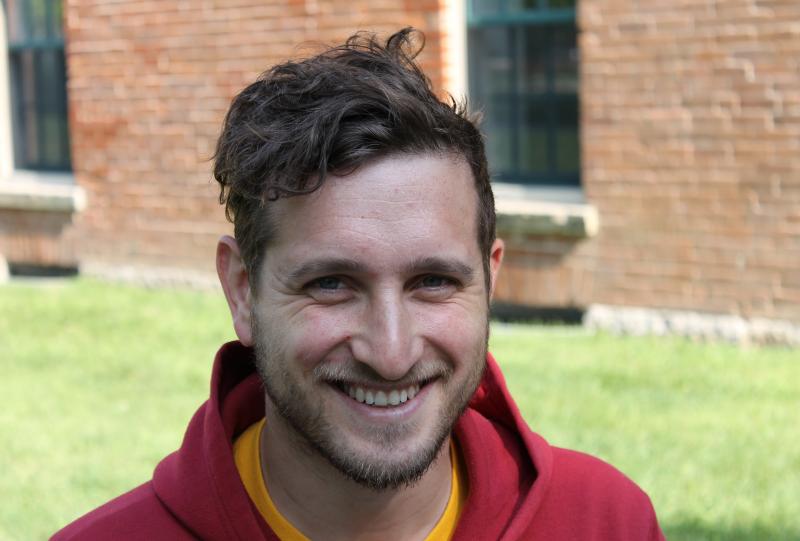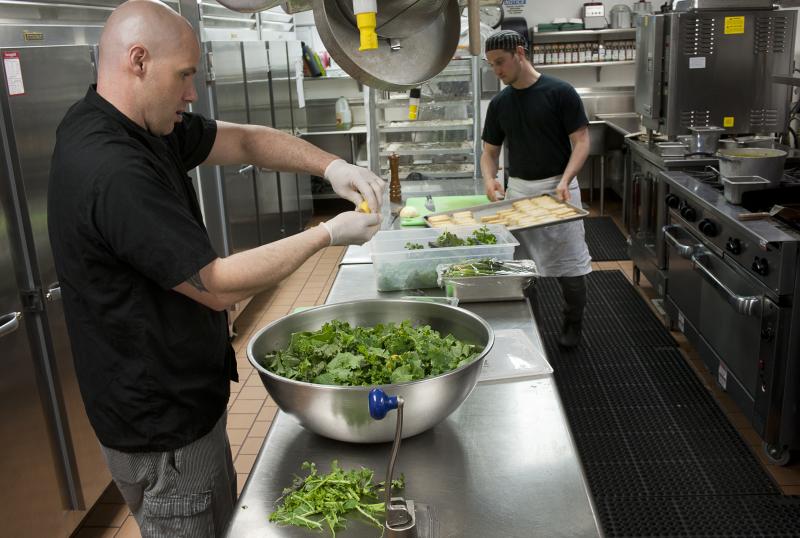Henry Anton Peller is majoring in soil science and political economy at Ohio State. He hopes one day to be a farmer, too.
“Right now I’m a professional agitator, you might say. I work with the Real Food Challenge, and we’re trying to break down institutional barriers at universities nationwide.”
Peller says the challenge is to get academia to lead the way to an improved food system, "one that is just for farm workers, good to our soils and to our environment, humane for animals.”

Lofty goal
The goal is to divert a billion dollars of college food budgets to local, sustainable sources within the next five years.
Harvard student Anim Steel co-founded the Real Food Challenge in 2008, and now serves as executive director.
Steel says the University of Cincinnati has already signed on. So has Ohio University, Oberlin, Ohio Wesleyan and Case Western Reserve University.
A 20 percent commitment
By promising to buy at least 20 percent of their cafeteria food from sustainable sources they’ve made what’s called the Real Food Campus Commitment.
“There are 35 schools that have signed on to that," says Steel, "and another 35 schools that are part of larger systems that have passed a policy consistent with our standards.”
Cal State’s system spends $100 million a year feeding 400,000 students. Its Campus Commitment means up to $25 million a year could go to local farmers.
Small but committed
 It’s a very different story at a small college in Yellow Springs that signed on early to the Real Food Challenge. It’s a very different story at a small college in Yellow Springs that signed on early to the Real Food Challenge.
Isaac Delamatre is the food service coordinator at Antioch College.
“We’re a self-operated food service outfit. We provide 19 meals a week to about 250 students that live on campus.”
The school has a history of being progressive. Its first president was the revolutionary educator Horace Mann.
It closed in 2008. When it re-opened in 2011 Delamatre, a former student, stepped up.
“The dining facility at the time was essentially an abandoned building. I pitched my idea. I was the only one with a plan, and I got in.”
Local farms benefit
His plan was fairly simple: “A farm to table focus.”
He sources from the Antioch College Farm, built four years ago on the school’s former golf course, and from nearby farmers and ranchers.
“Keener Walnut Grove Farm grows all of our beef, and a neighbor of his grows most of our pork. I have a couple other people who, they’re small farms so they’ll grow one or two hogs a year and sell them to me.”
Reflects Antioch’s values
He says the way students eat at Antioch ties in to the way they learn.
“Our philosophy is that it should be reflective of our values as a school that’s committed to social justice, committed to sustainability issues. So we’ve taken an approach that’s a little bit different from most schools, although a lot more are picking up on it.”
At his small college, he feels a big responsibility to lead the way.
“The larger the organization the more unwieldy it becomes. Also the more profit-driven they become.”
Calling for a cultural shift
Delamatre thinks too many colleges pander to students’ unhealthy habits.
“It’s a cultural shift that needs to happen really. We don’t need food courts. We don’t need Starbucks on every single college campus. We don’t need to be serving sushi at every single meal. We’re trying to offer something different at Antioch for sure.”
It seems to be working, at least from a health-perspective.
 “There’s kind of a running joke that we’re the opposite of the ‘freshman 15,’ where they actually lose the weight when they come here despite how much they eat. And they eat a lot. Young, growing people, they eat 2,000 to 2,500 calories a day.” “There’s kind of a running joke that we’re the opposite of the ‘freshman 15,’ where they actually lose the weight when they come here despite how much they eat. And they eat a lot. Young, growing people, they eat 2,000 to 2,500 calories a day.”
He says a new food revolution is growing, too.
“More and more people are getting into small-scale production agriculture. And the constituency has grown as well.
"People are sick of feeling bad. They’re sick of having low-quality food. They’re understanding that cheap food doesn’t mean good food.”
Isaac Delamatre thinks young people understand it best, and bear a responsibility to take the vanguard. |